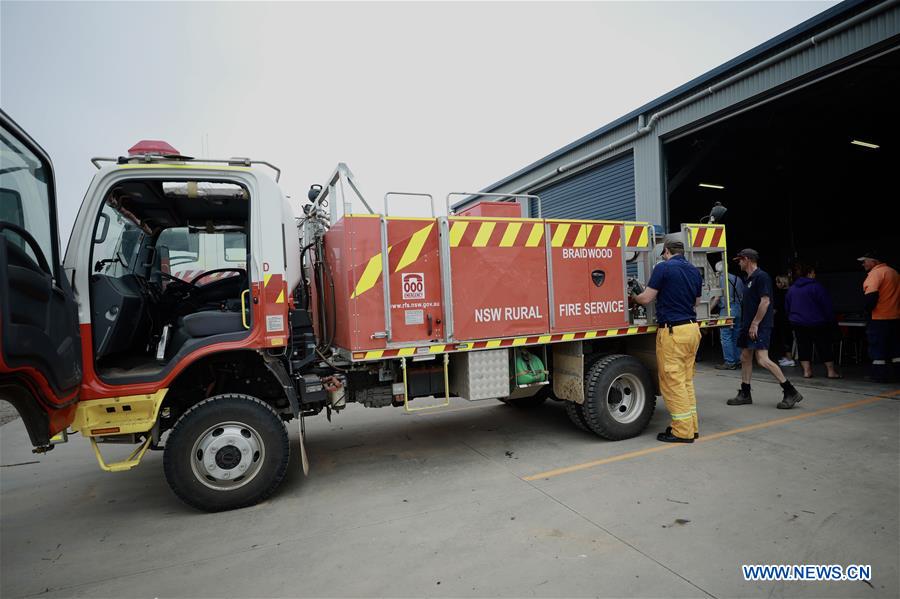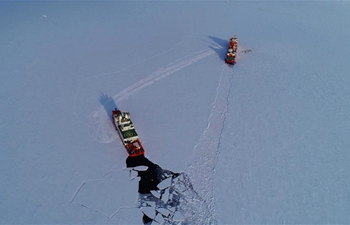
Photo taken on Jan. 8, 2020 shows a fire engine at Fire and Rescue New South Wales Braidwood Fire Station in Braidwood in the southeast of Australia. If without the bushfires, Braidwood in the southeast of Australia would have been busy at this time of the year, greeting tourists going to the beach of Batemans Bay. But the bushfires on New Year's Eve that had burned down houses and stranded holidaymakers in the tourism destination 45 kilometers away not only took a toll on local economy, but also cast a shadow over people's life there. (Photo by Chu Chen/Xinhua)
by Xinhua writers Bai Xu, Yue Dongxing
CANBERRA, Jan. 9 (Xinhua) -- If without the bushfires, Braidwood in the southeast of Australia would have been busy at this time of the year, greeting tourists going to the beach of Batemans Bay.
But the bushfires on New Year's Eve that had burned down houses and stranded holidaymakers in the tourism destination 45 kilometers away not only took a toll on local economy, but also cast a shadow over people's life there.
"It (bushfire) affected all of us. Every single person in the town has been affected in some way, economically, mentally or physically," said Brooke O'Connell.
The young woman is a volunteer firefighter who just returned to the town on Wednesday.
"My grandparents are volunteers, my dad is as well," she said. "So I have been helping out as I can."
She told Xinhua that bushfires close to Braidwood had been going on since November 29. "So I have been to Nerriga, Monga, etc."
Although O'Connell described the fire that she worked on as being "good at the moment," the road is still closed between Braidwood and Batemans Bay. An unnamed traffic control person noted more than 10 kilometers away a fire is still burning.
"Are we afraid? Yes and no," she said. "We are a strong community and we will get it done."
Farmer Peter James is a young father with two kids, who are one and two years' old each.
Although he said "we are used to the variability of the unknown," the family still took precautions against the bushfires.
They have a farm with 190 heads of cattle. But now the kids have left the farm with James' sister and wife. "We have got a rental place in Braidwood to move to," he said. "We wait for it to rain and come back home."
"My wife worries about health and safety of the kids," he said. "She is German and she is not used to it (bushfire)."
As James is looking after the cattle, he got suitcases ready, so that in case of emergency, he could leave quickly.
Barbara Hayes, in her 60s, also left her home to live with a friend.
She ran a gift shop called the Country Workbox. Visitors could be calmed down by the peaceful music, but Hayes would cough from time to time, which was a result of the smoke. "It is better to stay indoor. If you want to get out, you really need a mask," she said.
"Luckily these days we have a bit of calm weather. It's not as smokey as it has been, but it doesn't mean bushfires have already gone away," she told Xinhua. "We are getting it now, coming up from the south, steadily going through our national forest. It's really, really very sad that they can't stop it."
"It is frightening. It has gone through areas and burn down houses," she said. "A lot of properties have been burned down. But we don't know how long will it be before it comes close to Braidwood."
If it's getting worse, Hayes would go to Canberra, which is only an hour's drive away.
But for now, she believed that the most obvious impact was on businesses. "This town does on weekends rely a lot on business going through to the coast. People in Canberra go to Batemans Bay, and they go there every weekend. A lot of them stop and have something to eat here," she said.
Hayes mainly did local business, but she believed that the restaurants and cafes are suffering.
An example is Lenoa Coleman's cafe, where the business lately dropped about 30 percent from last year.
"This is actually our busiest time, but nobody is coming to Braidwood," said the 32-year-old shop owner. In her cafe only a handful of local residents buy a cup of coffee or an ice-cream.
However, with a two-year-old son and expecting another baby in April, the mother believed the risk for Braidwood town is over. "In the rural areas there is still risk."
That was what 93-year-old Paul Dann worried. He was in the cafe, talking with a friend about the fire.
Dann has a house in the woods, which he built in 1993.
"I have taken the most valuable, like the articles I have written and the photos to Canberra," he said. "So when the house is burned down, I don't think I will be terribly sad."
When Xinhua reporters stepped out of the cafe, Braidwood appeared as tranquil as any ordinary small Australian town. Only the national flag at the town center that flew at half-mast reminded people of the losses of bushfires.
The death toll from the unfolding bushfires in Australia, which began unusually early in September, has risen to 27 as the fires continue to burn.
As of Wednesday, more than 10.7 million hectares of land had been burned across the country. On Thursday morning, the state government of New South Wales (NSW) announced that 1,870 homes have been destroyed in the state.
"There has been many warnings," said O'Connell, closing doors of the food van that she ran. "But people are still trying to go on with their daily life and make it as normal as possible."











